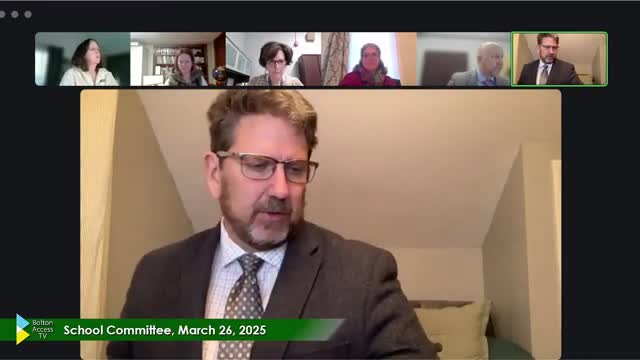Nashoba reports winter screening shows gains; K–3 early literacy screenings exceed state frequency
Get AI-powered insights, summaries, and transcripts
Subscribe
Summary
District winter screening data show growth toward the district student‑learning goal: 70.6% of students met or exceeded typical growth in reading and 76.8% in math; the district screens K–3 three times annually, above the Massachusetts two‑times minimum.
NASHOBA REGIONAL SCHOOL DISTRICT — Assistant Superintendent Laura Friend told the Nashoba Regional School Committee on March 26 that the district’s winter universal screening results show year‑to‑date gains and that the district is on track to meet its student learning goal.
Friend said the district goal is for 70% of students to meet or exceed typical growth; winter benchmark data showed 70.6% meeting or exceeding typical growth in reading and 76.8% in math, a 5.5 percentage‑point increase in math from fall to winter. She said STAR Early Literacy proficiency remains below 70% but that proficiency goals have been exceeded and the number of students in intervention categories declined.
Friend detailed K–3 early‑literacy screening practice and legal requirements. She said Massachusetts law requires K–3 screening twice per year; Nashoba screens three times per year and uses screening measures to diagnose specific skill gaps (phonemic awareness, phonics) so teachers can target interventions. The district reported early indicators of multi‑year improvement: students identified for intervention decreased from 97 (fall 2023) to 66 (winter 2025), and students in the urgent‑intervention category declined from 78 to 41 over the same span, a nearly 50% reduction.
Committee members asked about how families receive reports. Friend said families of students in the intervention and urgent‑intervention categories are contacted by phone and followed with a letter as required by law; families may request reports at any time and staff aim to provide reports adjacent to a conversation about the results. The committee also discussed differences between screening and other assessments: Friend described early‑literacy measures as assessing foundational skills (phonemic awareness, phonics), while STAR Reading covers vocabulary and comprehension. The district is collaborating across grade levels and with principals, coaches and teachers to use PLCs, MTSS structures and instructional materials to sustain progress.
The committee did not vote on this report; members asked for a future update at the end of the school year.
